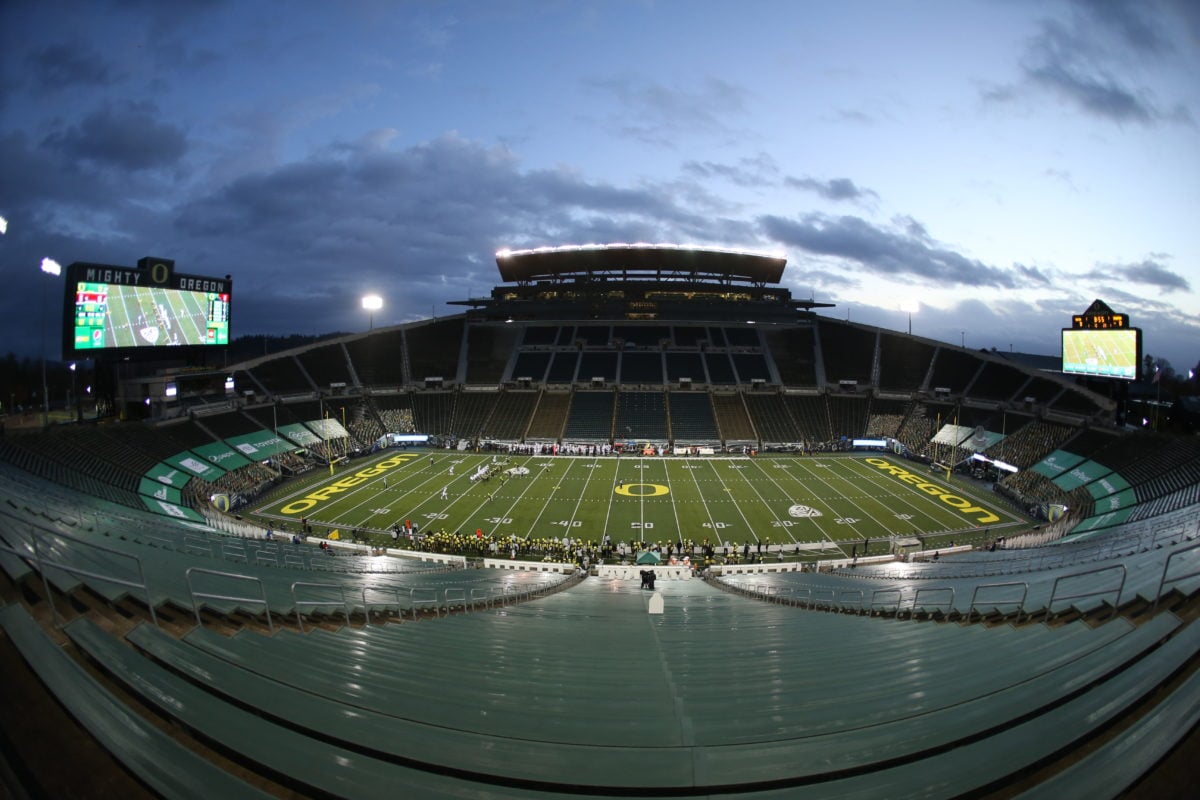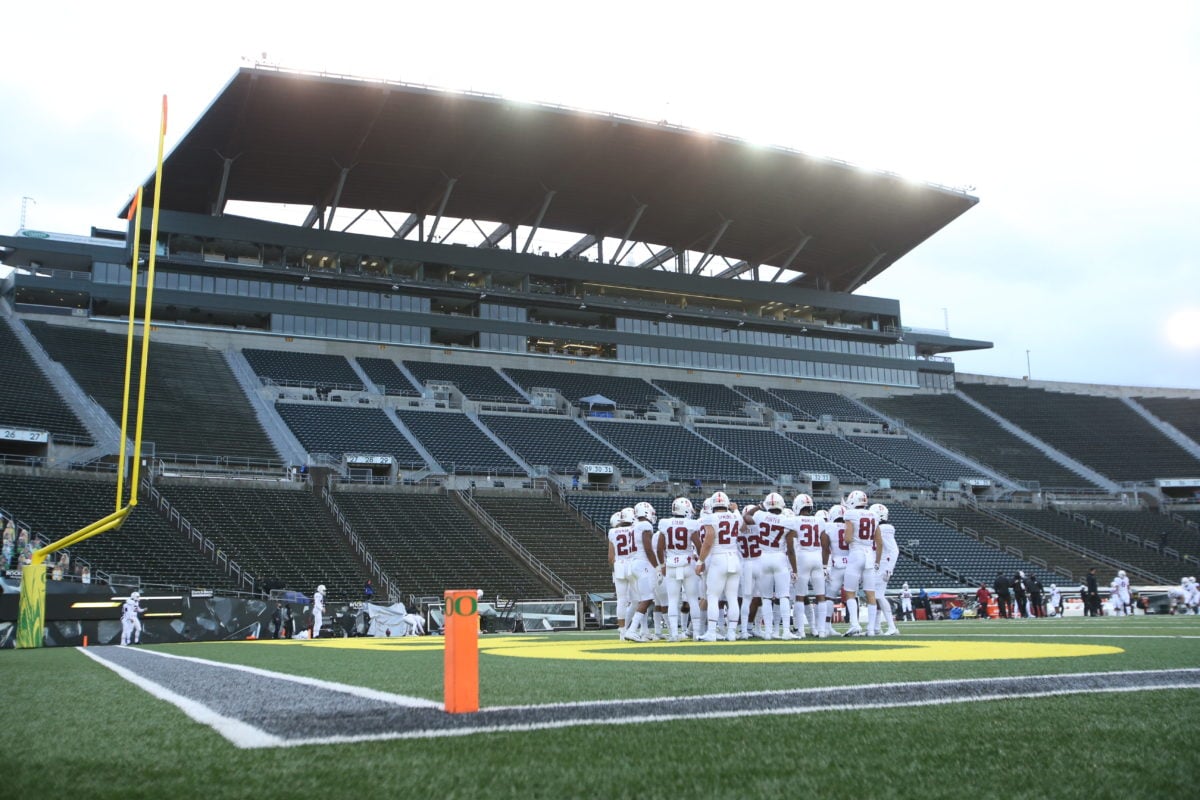I woke up Saturday morning to shouts of joy, celebratory music and banging pots and pan echoing through Los Angeles. After nearly a week of waiting, Joe Biden was named the presumptive 46th president.
But for many West Coasters, Nov. 7 was also a day of celebration because Pac-12 football was finally back — a prospect that seemed impossible just months ago. The long wait for West Coast sports was over — albeit under extremely different circumstances than the raucous stadiums and packed tailgates that the season normally brings.
The Pac-12 conference hadn’t seen action since early January’s bowl games, and teams like Stanford, who concluded with mediocre records, haven’t played since Nov. 2019. Thinking back on that rainy Saturday against Notre Dame a year later, Stanford Stadium now feels a world away. The venue embodied what “normal” used to be — a world pre-COVID-19, pre-moving out of Stanford, pre-2020 wildfires and pre-George Floyd that’s now hard to imagine was ever daily life.
When Stanford concluded it’s 2019 campaign with a home loss, it seemed like a long shot that Biden, then an underdog, would win the Democratic nomination — much less the presidency.
But so much has changed in the 12 months since.
All of last week I was anxious for the presidential results and stayed awake until early in the morning on Tuesday and Wednesday and Thursday and Friday nights as votes slowly but steadily trickled in. Despite the media’s warnings of a likely delay in results for months preceding Nov. 3, I didn’t realize how much my patience would truly be tested — and quite honestly, how impatient I really am.
I wanted a definitive answer, an end to my nervousness — but if there’s a trait that 2020 has fostered, it’s patience.
The Cardinal football team certainly knows this all too well.

The season was on and off and on and off since March as many players traveled home then back to campus, then home again, then back to campus in a seemingly useless attempt to play a season when all the odds were stacked against them.
Once the plans for an abbreviated season were finally solidified on Oct. 3, I, as a fan, became anxious for the season to start. I literally counted down the days to kickoff — evidenced by my headlines. But as someone who would never compete for the Cardinal herself, why does the season matter so much to me?
“Panem et circenses” from “Satire X” by Juvenal — or “bread and circuses.”
Juvenal used the phrase to critique Roman society, stating that the masses only needed bread and circuses — more loosely, food and entertainment — to meet their basic needs and serve as a distraction from broader issues, like governmental corruption.
So today, when our current president refuses to concede the election he lost, COVID-19 case numbers are hitting new highs and injustice is still rampant — as evidenced by the continued murders of Black men (who are the backbone of nearly every professional and high-revenue collegiate sport) — sports games do serve as a momentary diversion.
For the casual viewer, there’s something comforting about becoming a spectator for a few hours. Watching a football game, no matter how chaotic or frustrating the antics on the field are, allows viewers to forget about some of the constant stresses of the world in 2020.
However, new additions to games — including Stanford’s warmup uniforms and pre-game kneel for racial justice or the masks every attendee must wear — remind us that there are still fights beyond football. We cannot become complacent.
Of course, sports games themselves alone are not going to alleviate or rectify such deeply rooted social and political issues, but the national broadcast provides a meaningful platform to disseminate information and prompt further conversation off the field.
Thus the season opener this year was not just a season opener, but both a welcome return to normalcy and a call to action. The athletes on the field are laying out a blueprint of the world they hope to see and forge, despite the unprecedented current conditions — just as Biden did on the campaign trail.
But conditions won’t fully return to “normal” for a while, and those needed changes spearheaded by athletes won’t come over night. Again, we need patience.
Stanford football had to be patient when traveling to San Mateo County to practice, had to be patient when picking up to-go meals instead of the usual team dinners and now has to be patient for the return of senior quarterback Davis Mills, senior wide receiver Connor Wedington and junior defensive Trey LaBounty.
But patience pays off — as we can see by the standout performances, despite Saturday’s loss.
Junior wide receiver Simi Fehoko, sophomore linebacker Levani Damuni, and freshman quarterback Tanner McKee were patient. All three went on LDS missions, putting their academic and athletic lives on hold for two years. But the extended wait to take the field didn’t stop Fehoko from averaging over 29 yards per reception, Damuni from picking up two turnovers on defense or McKee from leading two drives in his first game as a college student-athlete.
Mills and junior second-string quarterback Jack West are all too familiar with the waiting game. Mills sat behind quarterback K.J. Costello ’20 for nearly three seasons, and now West sits behind Mills. But despite the wait, West was ready to go when he suddenly was called up just hours before kickoff.
Sophomore running back Austin Jones waited, too. Running back Cameron Scarlett ’19 had the starting job during his fifth year, but Jones took the time to learn the playbook and thrived when given the spotlight on Saturday.

But Biden, too, epitomizes the need for patience. He ran for president first in 1987, and finally claimed the job 33 years later.
Sports and politics have always been interconnected, and this merger fully came to fruition mid-game when Stanford and Oregon’s ABC stream was replaced with Biden’s victory speech Saturday night — requiring patience on the part of every football fan absorbed in the then-tied scoreline.
The overlap was a reminder that the fate of football is heavily intertwined with the well being of society at large. Without a healthy population and a world nation where people of all backgrounds can live without fear, the athletic playing field will not be level.
So although we all desire a “return to normal” and athletic diversions along the way, the waiting game itself is valuable. Patience, both on the field and in the White House, is a virtue — especially in a time when there is inherently so little we can control and when progress is often slow.
Contact Cybele Zhang at cybelez ‘at’ stanford.edu.
